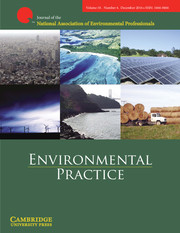Article contents
Compliance and Enforcement in Environmental Management: A Case of Mining in Ghana
Published online by Cambridge University Press: 16 August 2005
Abstract
Environmental regulatory agencies are an important element in regulatory policy design and its implementation. In this regard, it is incumbent on them to enforce and monitor environmental regulations, as increased monitoring and inspections can increase compliance. The research presented here has identified a number of factors that impede effective monitoring and enforcement by environmental regulatory institutions in Ghana. I also propose that direct external control and the threat of punishment by regulatory agencies are not the sole mechanisms that motivate regulated organizations to work toward the attainment of environmental goals and objectives. In some instances, regulated organizations implement a policy of voluntary compliance in the service of their committed objectives. Furthermore, the watchdog behavior of local communities plays a crucial role in sensitizing mining firms about the impact of their activities on the environment. In this study, in addition to voluntary compliance, traditional authorities and other informal organizations have been effective in controlling and ensuring environmental compliance by mining organizations.
Information
- Type
- COMMENTARY
- Information
- Copyright
- © 2003 National Association of Environmental Professionals
- 9
- Cited by

